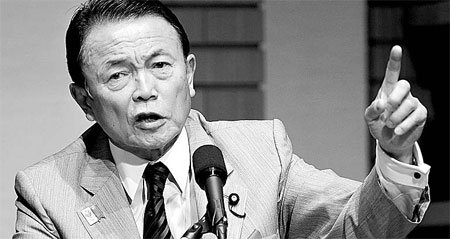Aso retracts Nazi remarks
|
Japanese Deputy Prime Minister Taro Aso has said Tokyo could learn from Nazi Germany when it comes to constitutional reform, prompting rebukes from a Jewish human rights group. AFP |
Japan's deputy prime minister in hot water after controversial comments
After sparking criticism at home and abroad, Japanese Deputy Prime Minister Taro Aso on Thursday retracted remarks that suggested Tokyo should follow the Nazi example to change the country's constitution.
The outspoken Aso, who is also finance minister and a former prime minister, said his remarks were misunderstood and he only meant to say that loud debate over whether Japan should change its postwar constitution was not helpful.
Critics said Aso's controversial remarks underlined Tokyo's attempt to revise the country's pacifist constitution and its insufficient reflection on its war crimes.
Divided opinion on the issue within Japan and outraged reactions from China, the Republic of Korea and a US-based Jewish group indicated how difficult such a revision process would be, they added.
"We demand the Japanese side reflect on its history, fulfill its commitments on historical issues and win the trust of its Asian neighbors and the international community through concrete actions," the Chinese Foreign Ministry said on Wednesday.
Japan's neighbors and the international community have to be more vigilant over the country's development direction, spokesman Hong Lei said in a news release.
Aso was discussing constitutional revision in a speech to a conservative think tank on Monday when he made the controversial statements.
"Germany's Weimar constitution was changed before anyone realized," Aso said. "It was altered before anyone was aware. Why don't we learn from that technique?"
Aso also said it is natural to visit the Yasukuni Shrine to pay tribute to those who sacrificed their lives for the country.
The shrine to the 2.5 million Japanese war dead, including 14 convicted Class-A war criminals, is seen as a symbol of Japan's past militarism. Japanese politicians' visits to the shrine often trigger strong opposition from people whose bitter memories of Japan's World War II militarism run deep.
Tokyo, which has said it wants to revise its constitution to define Japan's defense forces as a fully-fledged military force, moved to distance itself from Aso's remarks.
"I want to make it clear that the Abe cabinet will never view the Nazi government positively," Chief Cabinet Secretary Yoshihide Suga, Tokyo's top spokesman, said on Thursday.
Japan's Social Democratic Party, an opposition party, requested Aso resign his cabinet and parliamentary posts for his remarks, which showed a lack of awareness of historical fact.
Aso should retract his remarks, apologize to the victims of the Nazis and resign from his position, said Seiji Mataichi, general secretary of the Social Democratic Party, in a statement released on Wednesday.
Yang Bojiang, a Japanese studies expert at the Chinese Academy of Social Sciences, said the Japanese government was likely to have made its self-defense statements because of pressure at home, rather than international pressure.
"Constitutional revision has obviously become one of the hottest topics among Japan's political circles, but the various groups have not reached an agreement about the details of revision," Yang said.
"This is not an easy task. ... Aso prefers a quiet revision, and Abe may want extensive debates before revision, but the Japanese people and members of the international community who understand the risks oppose it," he added.
Li Wei, director of the Institute of Japanese Studies at the Chinese Academy of Social Sciences, said the controversial remarks frequently made by Japanese politicians were not just "slips of the tongue", but showed a lack of reflection on the country's militaristic past.
Rabbi Abraham Cooper, associate dean at the Simon Wiesenthal Center, a US-based Jewish rights group, said, "The only lessons on governance that the world should draw from the Nazi Third Reich is how those in positions of power should not behave."
On Tuesday, Seoul said Aso's remarks "obviously hurt many people", urging Japanese political leaders to be "careful with their words and behavior".
"It is also clear how such remarks are seen by the people of neighboring countries invaded by imperial Japan in the past," a ROK foreign ministry spokesman said.
Aso is known for his sometimes uncomfortable and clumsy remarks, including saying earlier this year that elderly people should "hurry up and die" to avoid taxing the country's medical system.
Zhang Fan and AFP contributed to this story.
zhaoshengnan@chinadaily.com.cn
(China Daily 08/02/2013 page11)















